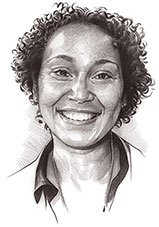My Northwestern Direction: Zara Cooper
Tell us what you think. E-mail comments or questions to the editors at letters@northwestern.edu.
Find Us on Social Media
by Zara Cooper ‘91
Assistant Professor of Surgery, Harvard Medical School
Associate Surgeon, Division of Trauma, Burns and Surgical Critical Care, Brigham and Women’s Hospital
I’ve had to have a lot of hard conversations in my career. Most of my work is with acutely sick patients who are facing difficult decisions. Just last month I was visiting a patient with advanced cancer and had to give him and his family a poor prognosis — in the middle of the night.
Hard conversations can be uncomfortable, but they’re also essential. I came to my career in medicine later in life than some, and my experience and training in communications at Northwestern has put me in a unique position. I’m able to help surgeons improve the difficult conversations they have with their patients. That’s my passion.

Illustration by Bruce Morser
I went to Northwestern specifically to become a journalist. But I didn’t end up getting a journalism degree. One of my classes required travel, but I felt like I couldn’t leave campus because of my involvement in student organizations! So I transferred to the School of Communication.
As a senior I was co-chair of Dance Marathon, which raised money for the Les Turner ALS Foundation that year. After graduation, I got a great job at an advertising agency then known as DDB Needham. At the same time, I still felt connected with the Les Turner ALS Foundation, so I joined its junior board for young professionals.
One day the ALS Foundation asked me to write a short profile of Michael Minieka ’89 GME, a neurologist who’s still an assistant professor of clinical neurology at Northwestern’s Feinberg School of Medicine. As it turned out, Dr. Minieka had also worked in advertising before making a career switch to medicine. And as I followed him around his clinic that day, I was amazed. I saw the interactions he had with his patients and how meaningful they were. It was an inspirational moment — a turning point.
I worked out a deal with my boss that allowed me to start taking pre-med classes to prepare to apply to medical school. And the rest is history. Today I’m an assistant professor of surgery at Harvard Medical School and a surgeon at Brigham and Women’s Hospital in Boston. I work primarily with critically ill patients, focusing on the intersection of palliative care and surgery. Palliative care is simply a philosophy that’s focused on a patient’s comfort and quality of life.
People often say that doctors don’t communicate that well, especially when it comes to end-of-life care. Explaining the intensive care unit to someone who has never been in one can be like explaining a foreign country, and doctors who are used to that kind of chaos can have a difficult time seeing it through the eyes of a scared and sick patient. Much of our poor communication leads to what I call “non-beneficial care” — care that doesn’t achieve goals aligned with our patients’ preferences or sometimes even their best interests.
So I convened an interdisciplinary panel at Harvard with my colleague and friend Atul Gawande, a surgeon and writer. I gathered a host of internationally recognized experts from many fields, and we came up with an innovative framework: recommendations for how surgeons should talk with families and patients who are faced with an acute surgical emergency. Our recommendations are having a real impact; I’m excited to keep making it easier to have hard conversations.
I think my particular background allows me to approach these problems in a special way. I was fortunate to have been given a lot of opportunities to lead in my time at Northwestern. This was essential to me, as was my Northwestern communications training. Now I’m in a rare position to change the way that surgical patients receive care. I want to help my fellow surgeons and doctors do things for patients and not just to them. That motivates me a great deal.
I’ve taken a circuitous route but one that I think has some kind of logic. Improving lives by improving communication is something I could only have accomplished with my experience at Northwestern. And for that I’m truly grateful.



 Facebook
Facebook Twitter
Twitter Email
Email


